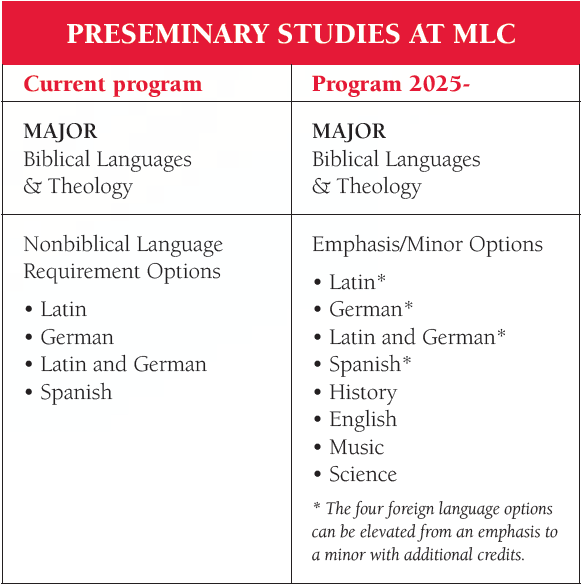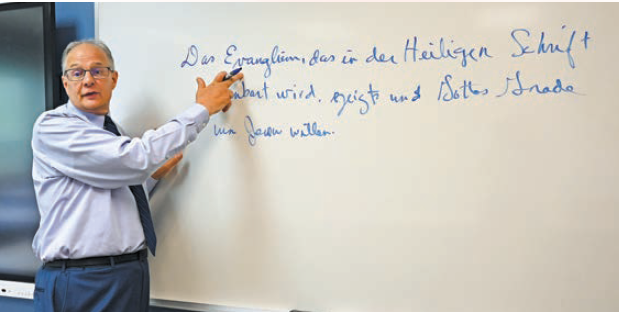“Minor” but Significant Change in
Preseminary Curriculum
By Professor James Danell NWC ’86, WLS ’90
Dean of Preseminary Studies, Professor of German
How does Martin Luther College best train young men for enrollment at Wisconsin Lutheran Seminary (WLS)? If you asked 100 people, there’s a good chance you’d get 100 different answers—each based on the personal experience of the individual answering it.
Seven years ago, MLC’s preseminary faculty took up a serious study of this question. The discussion included representatives from MLC, WLS, and our prep schools, as well as MLC students. We also consulted the MLC Governing Board, the WELS Conference of Presidents, circuit pastors, high school foreign language teachers, and members of the WELS Board for Ministerial Education. In the fall of 2025, we plan to put the results of that discussion into place. It will be the most significant change to our preseminary training since 2000.
THE CHANGE: Going forward, students will have more flexibility when it comes to earning their Bachelor of Arts degree. Though their major in biblical languages (Greek and Hebrew) and theology will not change, they will be able to choose one of eight emphases (German, Latin, German & Latin, Spanish, English, history, music, or science) or one of four minors (German, Latin, German & Latin, Spanish).
 REASONS FOR THE CHANGE: With support from all key constituencies, including WLS, the preseminary program is making this change to align requirements with three realities.
REASONS FOR THE CHANGE: With support from all key constituencies, including WLS, the preseminary program is making this change to align requirements with three realities.
First, preseminary students historically came from our prep schools, schools specifically designed to put young people on a path toward public ministry. To meet that goal, their curricula included a strong Latin and German component. This is still true. The MLC preseminary program continued that training by requiring more study of those languages so important to the confessional Lutheran church.
In the last decades, however, our area Lutheran high schools (ALHS) have grown substantially, both in size and number. Many MLC students have come from these ALHSs, as well as from public schools. We couldn’t be happier about that! Their high school curricula are designed to meet the needs of students seeking various vocations, and very few offer four years of face-to-face Latin and German language.
A second reality is this. As a result of curriculum changes in 2000, there was a change to the nonbiblical language requirement at our seminary. Though it still very much values the confessional languages, the seminary no longer requires that all traditional-aged students be able to read German and Latin.
A third reality is the strong, consistent feedback we hear regarding the current requirement that all preseminary students must take six semesters of a third, nonbiblical language. The pushback isn’t new. This is the fourth time since 1960 that our worker training system has discussed a change like this. In surveys conducted as part of this most recent discussion, 20-35% of students reported a negative impact of this requirement on willingness to prepare for pastoral ministry or to continue preparation for it. They also reported a negative impact on the time and energy available to devote to the study of the biblical languages of Greek and Hebrew, so important for pastoral ministry.
Over time, a consensus has developed that expanding options to include non-language choices aligns requirements with realities. As we do this, however, we want to emphasize our continued commitment to the study of nonbiblical languages. Our prep schools are committed to retaining the confessional languages. The preseminary requirement of two years of foreign language study, presumably Latin, German, or Spanish. Our seminary will still encourage the use of these languages on their campus. And at MLC we will continue to encourage all those with the gifts and interest to continue to study one of these languages, perhaps even earning a minor in it.
THE PLUSES AND MINUSES OF THE CHANGE: Some students who could do well in one of these nonbiblical languages may use the freedom this change offers not to study them. This is very much on our hearts. The WELS needs people who can work in these languages. A significant number of American congregations, not to mention our Latin America missions, use Spanish in their ministries. German and Latin are the languages the confessional Lutheran church used for 400 years. These are the languages our greatest theologians wrote and spoke, and we remain committed to offering them.
But expanding our students’ choices also brings exciting possibilities. It’s exciting to think about the potential when students freely choose to devote themselves to German, Latin, or Spanish. It’s exciting to think about the benefits that will come from having pastors who have a broader, more in-depth knowledge of history, who have had additional opportunities to read broadly and write well, who can more knowledgeably engage with people in the area of science, or who are better trained in music composition and history, including the musical heritage of the Lutheran church.
Because we do have a special concern for the continued study of German and Latin in the WELS, we have also established the Confessional Language Scholarship Fund. Gifts given to this fund will provide annual scholarships to students who demonstrate proficiency in studying one or both confessional languages. We invite you to consider supporting it.
We also ask for your prayers that God would bless this change and that through it, more young men would be led to say, “Here am I, send me.”






